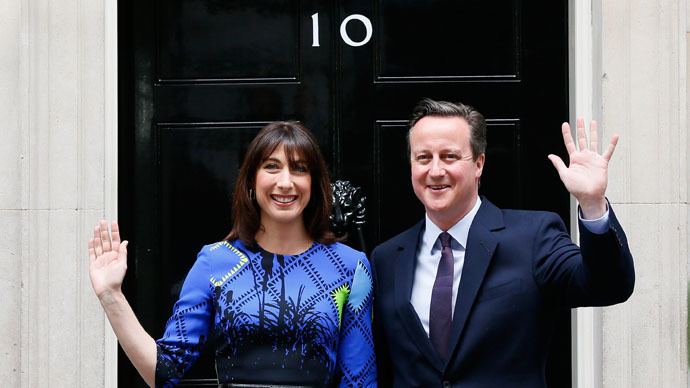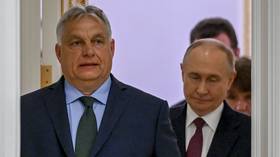May 7th, 2015 - the day the United Kingdom died?

Nobody doubts the UK General Election delivered an extraordinary outcome. However, in the long term, May 7th 2015 could eventually be remembered as the day the UK croaked it.
The pundits and pontificators spun Election 2015 as a close run vote, certain to deliver a hung parliament. They were misguided. Instead, David Cameron reigns supreme with an overall majority for his Conservative Party and Ed Miliband, Nick Clegg and Nigel Farage have all resigned. While the latter will probably reappear without much delay, the first two are now consigned to the wastebasket of history.
In a single day, Miliband has gone from being the favorite to enter 10 Downing Street to the back-benches. Meanwhile, David Cameron has spent the afternoon kicking back with the Queen. It all sounds like nothing has changed. This is wrong. Everything has changed.
While the immediate analysis focuses on the destruction of political careers, May 7th 2015 has greater significance. It was the day the United Kingdom, as it’s presently constituted, entered its endgame. The Conservative majority and the SNP’s Scottish landslide mean checkmate for the union.
Had Labour, as expected by pollsters, formed the next government, the UK’s current composition would have been safe, at least in the short-term. Instead, we have witnessed the triumph of nationalism, both Scottish and English, and the squeezing of the middle ground. There's a smell resonant of Czechoslovakia in 1992 wafting from Britain.

Brussels, Edinburgh and Belfast - in or out?
David Cameron is now honor bound to hold an “in-or-out” referendum on Britain’s membership of the EU before the end of 2017. It’s increasingly clear that the electorate will vote to leave. However, it won’t be the UK that decides to abandon the EU project, it will be England. Scotland, Wales and Northern Ireland will almost certainly vote to remain as members. This, I believe, will be catalyst for a second Scottish independence poll and the subsequent establishment of a Scottish state. Scotland's needs are different from those of England and Edinburgh needs access to the world's largest market in order to realize its dreams.
The position of Northern Ireland is another headache. Already poor by comparison with its more advanced southern neighbor, a ‘Brexit’ would be catastrophic for the province. The Irish Republic would be the biggest winner from a UK exit (in terms of foreign direct investment) so unless Ulster jumped ship, that gap would only widen. Furthermore, if Ireland is forced to re-install border controls with the north-eastern enclave, the effect would be devastating on its struggling economy, which is already heavily subsidized by London. Another problem for Ulster is that I’m not sure the Irish Republic would accept the idea of reunification, even if Belfast wanted it. Lofty aspirations are often thwarted when reality dawns and euro and cents are counted.

The failure of the system
While the biggest election shock was Labour’s anemic performance, the failure of UKIP to make a major impact can’t be overlooked. A clutch of analysts predicted a political earthquake as Farage’s disciples marched on Westminster. Instead, what we witnessed was more like a gentle shake. That said, the seat figures mask the truth here.
Due to the UK’s outdated first-past-the-post electoral system, UKIP managed to gather 3.8 million votes and wind up with 1 seat. By contrast, Ulster’s SDLP received a mere 99,000 preferences and now hold 3 Westminster perches. This is, obviously, completely undemocratic and rather insane. The method of seat allocation is definitely not fit for purpose. In a modern democracy (like Germany for example), UKIP would be celebrating the acquisition of around 80 parliamentary berths.
Wow. Under proportional representation, #ukip would have won 83 seats and #greens would have 25 pic.twitter.com/PZWUsMkKu6
— Stacy Herbert (@stacyherbert) May 8, 2015
Dissonantly from UKIP, only around 1.4 million penciled an ‘x’ for SNP candidates. Nevertheless, 56 of their number are heading to London, out of a possible 58. The same system which worked against Farage has delivered for Nicola Sturgeon. The SNP’s success only reinforces the widely held view that Scottish independence is now inevitable. London’s political elite, aided by a myopic media, lied to the Scottish people during last year’s referendum campaign. Now those chickens are coming home to roost.
For the Liberal Democrats, and their leader Nick Clegg, the result was a wipeout. However, it wasn’t surprising. Some years ago, Clegg went to sleep one night and woke up to see Cameron wearing his clothes. The Prime Minister is not a conservative; he’s a classic British liberal. If you disbelieve me, check out his policy positions across a broad spectrum from gay marriage to foreign aid. Cameron is less a latter-day Margaret Thatcher, more a half-baked Lloyd George. Indeed, just as the ‘welsh wizard’ lost Ireland almost a century ago, Cameron’s legacy will, almost certainly, be the separation of England and Scotland.

Looking to foreign shores
Juggling the conflicting passions of English and Scottish nationalism will be time consuming for Cameron, so expect a less hands-on foreign policy role for the PM. Instead, it’s almost certain that the wishy-washy Philip Hammond will be replaced by a real ‘big beast.” The two main contenders would appear to be Theresa May and Boris Johnston. Cameron has committed to standing down before 2020, so he’s likely to choose the one that he doesn't want to succeed him. With a growing economy, keeping them focused on external affairs, especially the drudgery of EU negotiations diminishes the reflected glory from domestic successes.
I expect Johnson to be installed as Business Secretary, with May moving to Whitehall. Cameron may perceive May as “Britain’s answer to Angela Merkel,”soldiering in what would be an increasingly hostile Brussels environment for the UK government when the referendum on EU membership is called.
Unlike the hapless Hammond, a pro-American ideologue who was hopelessly unqualified for the prestigious post, May is seen as a foreign policy pragmatist. It’s also believed that May is a British patriot who will put the countries’ own interests first, not those of Washington. Additionally, the outgoing home secretary is opposed to the UK remaining in the EU, in its present form.
An election that promised a hung parliament, has delivered an overall Conservative majority. Ed Miliband and Nick Clegg have departed the arena and Nigel Farage's promised earthquake has been replaced by his own voluntary hibernation. However, the biggest winners are probably Scotland's nationalists. The next few years will be fascinating. Will David Cameron come to be remembered as the man who dismantled the UK? I think he will.
The statements, views and opinions expressed in this column are solely those of the author and do not necessarily represent those of RT.
The statements, views and opinions expressed in this column are solely those of the author and do not necessarily represent those of RT.













